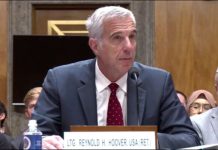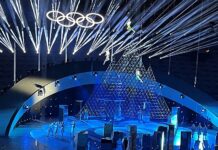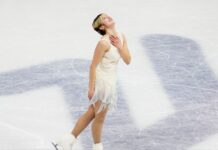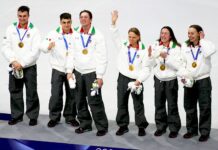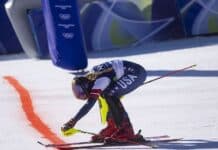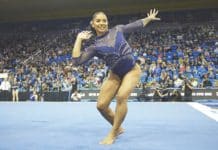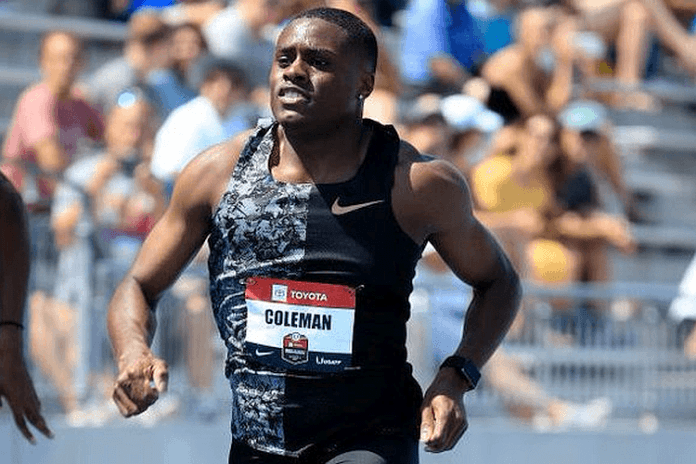News, views and noise from the non-stop, worldwide circus of Olympic sport:
● International Olympic Committee ● IOC President Thomas Bach of Germany has been all over the news in the past few days, with a written reflection on his experience as an athletes appearing widely as an editorial in worldwide news media, and being awarded the Seoul Peace Prize for his work in creating positive links with North Korea that helped the 2018 Olympic Winter Games take place in PyeongChang (KOR).
Bach’s op-ed piece was titled, “The Olympics are about diversity and unity, not politics and profit. Boycotts don’t work” and remembered his first Olympic experience in 1976″
“Shortly before the opening ceremony, I looked outside the window of our room in the Olympic Village to see a large group of African athletes with packed bags. Many were in tears, others hung their heads in despair. After asking what was happening, I learned they had to leave because of a last-minute decision by their governments to boycott the Games. Their devastation at having their Olympic dream shattered at the last possible moment after so many years of hard work and anticipation still haunts me today.”
And he remembered how the tables were turned on him four years later, when West Germany skipped the 1980 Games in Moscow:
“I strongly opposed this boycott because it punished us for something that we had nothing to do with – the invasion of Afghanistan by the Soviet army. I had to realise that the sports organisations had very little, if any, political influence, while on the athlete side we had very little say. Our voices were heard neither by the politicians nor by our sports leaders. This was a very humiliating experience.”
And he noted both the IOC’s limits and its possibilities:
● “The unifying power of the Games can only unfold if everyone shows respect for and solidarity to one another. Otherwise, the Games will descend into a marketplace of demonstrations of all kinds, dividing and not uniting the world.”
● “The Olympic Games cannot prevent wars and conflicts. Nor can they address all the political and social challenges in our world. But they can set an example for a world where everyone respects the same rules and one another.”
Any changes to the IOC’s Rule 50, which opposes on-field and ceremonies demonstrations, will have to overcome Bach’s obvious preference to leave it intact.
In a lengthy address delivered remotely during Monday’s Seoul Peace Prize ceremony, Bach echoed the same themes, adding:
“At the Olympic Games, there is no discrimination, everyone respects the same rules, regardless of social background, gender, religion or political belief. At the Olympic Games, we are all equal.
“In this way, the Olympic Games show us that despite all our differences it is possible for
humankind to live together in peace and harmony.”
and
“We know that our ideals are not shared by everyone in this world, they are contrary to the zeitgeist. But a disregard of our Olympic ideals does not negate their inherent value. On the contrary: it demonstrates the importance of our mission, to strive to uphold these values and ideals in a world where peace and solidarity are under threat.”
The theme of “unity” was strongly stressed by IOC chief Juan Antonio Samaranch (President from 1980-2001), who created the IOC Athletes’ Commission in 1981 and invited Bach – then a German fencer – to be a member. This concept has been the core principle of the IOC ever since, and Bach is working energetically to expand it.
● Athletics ● The fastest man in the world has been stopped, at least for now, from competing in Tokyo in 2021.
American sprint star Christian Coleman, the 2019 World Champion in the 100 m, was found to have committed an anti-doping violation and was suspended for two years by the arbitration panel of the Athletics Integrity Unit.
The 22-page decision reviewed the “whereabouts” failures that led to the violation, including a missed test on 16 January 2019 (not contested), a filing failure on 26 April 2019 (contested) and a missed test on 9 December 2019 (contested). The decision noted specifically that “there is no suggestion that the Athlete has ever taken a Prohibited Substance.” But three missed tests within 12 months equal a violation.
On 26 April 2019, Coleman had listed his home address in Lexington, Kentucky, but was called prior to his testing time by telephone and told the Doping Control Officer that he was, in fact, at the Drake Relays in Des Moines, Iowa at the time. Coleman updated his location online prior to the specified testing time, but the U.S. Anti-Doping Agency recorded the situation as a “filing failure” rather than a missed test. The panel held that since Coleman didn’t change his location until after being called by the Doping Control Officer, and two days after going to Des Moines, that the filing failure stands.
Regarding the missed test on 9 December, Coleman was required to be available for testing between 7:15 p.m. and 8:15 p.m. at his home in Lexington. The Doping Control Officer was there, rang the bell every 10 minutes and then left. Coleman claims he was back prior to 8:15 p.m., but the panel did not “accept the Athlete’s evidence,” given that he had a receipt time-stamped at 8:22 p.m. from a nearby store.
Thus, Coleman was found to have committed three “whereabouts” violations within a 12-month period and was suspended for two years, ending on 13 May 2022. This would keep Coleman out of the 2020 Olympic Games, but would allow him to compete for a spot on the U.S. team for the 2022 World Championships, which will be held in Eugene, Oregon.
The decision further noted that Coleman had barely escaped a prior “whereabouts” suspension for three failures between June 2018 and April 2019. Although this had no impact on the length of the suspension, the panel noted “Unfortunately, we see this case as involving behaviour from by the Athlete as very careless at best and reckless at worst.”
The finding will undoubtedly be appealed to the Court of Arbitration for Sport, for which a filing must be made within 30 days.
¶
The Court of Arbitration for Sport announced its long-awaited decision in the appeal by American Paralympic sprinter Blake Leeper to be able to compete in open competition using his prostheses.
Leeper, now 31, won silver and bronze medals at 2012 Paralympic Games, but stunned the track & field world at the 2019 USA Track & Field National Championships, winning his 400 m semifinal in 44.38 and then finishing fifth in the final in 44.48. He could have been selected for the U.S. 4×400 m relay pool for the 2019 World Championships, but was not allowed to enter by the IAAF (now World Athletics). In February of this year, World Athletics denied Leeper’s request to use his current prostheses to qualify for the 2020 Olympic Games.
The CAS panel agreed with Leeper that it is not his responsibility to prove “that the use of such mechanical aid will not provide the athlete with an overall competitive advantage over an athlete not using such an aid” and that the burden rests with the relevant federation, in this case World Athletics. Even with the burden shifted however:
“[T]he Panel considered the extensive evidence put forward by the parties’ experts and concluded that the running-specific prostheses used by Blake Leeper indeed gave him an overall competitive advantage in the 400m event over an athlete not using such a mechanical aid since they enabled him to run at a height that was several inches taller than his maximum possible height if he had intact biological legs. Accordingly, the Panel ruled that Blake Leeper may not use his particular running-specific prostheses WA-sanctioned 400m events, including WA Series competitions and the Olympic Games.”
Since the holding would allow prosthetics which provide no advantage vs. a non-disabled athlete, World Athletics issued a statement noting that its rules will be reviewed. It also noted of the ruling:
“Specifically, the CAS found that Mr Leeper’s prostheses make him 15cm taller than he would be if he had biological legs (he would be 5’9’’ with biological legs, but his prostheses give him the legs of a 6’8” man); and that this increased leg length gives Mr Leeper an artificial performance advantage over 400m of ‘several seconds’.”
Leeper’s attorneys released a furious statement which included:
“Mr. Leeper will file a legal action to challenge this racially discriminatory decision of the CAS panel to preclude him, as a Black athlete, from competing at the same height, on the same prostheses, that he has been using in world competitions for five years. He has already met the qualification time to run in the Tokyo Olympics, which is his dream, and he will not give up his fight to compete against able-bodied athletes on the Olympic stage on the basis of a racist study that does not include any data from Black athletes in its database.”
World Athletics replied:
“World Athletics strongly rejects the (new) allegation from Mr Leeper’s legal team that the finding that he ‘runs tall’ is based on a ‘racist’ Paralympic rule. The IPC rule on ‘Maximum Allowable Standing Height’ (MASH) is based on the best available evidence of body dimensions and has been applied for several years to all Paralympic athletes (including African-American athletes) without issue. World Athletics is aware of no proof that African-American athletes have significantly different bodily dimensions (proportionality), and certainly not to the extent identified in this case. The 15cm disparity found in Mr Leeper’s case between his prosthetic leg length and his natural leg length is not due to racial differences in body dimensions.”
Leeper’s avenue of appeal of the CAS decision, if desired, is to the Swiss Federal Tribunal.
¶
Applications are being taken through Sunday (1 November) for emergency grants from the USA Track & Field Athletes Advisory Committee. A total of 25 grants of $1,000 each are available, to be paid to third parties for expenses such as rent or mortgage payments, car payments, medical expenses and similar items:
“The Athletes Advisory Emergency Relief Fund’s mission has been expanded to consider 2020 and the extraordinary challenges that the COVID-19 global pandemic has presented to track and field athletes.”
● Biathlon ● The Court of Arbitration for Sport’s Anti-Doping Division handed down a decision confirmed a doping violation by Russian star Evgeny Ustiugov for the period of 2010-14, based on changes recorded in his Athlete Biological Passport profile. The announcement noted:
“Furthermore, the CAS ADD, which serves as the Disciplinary Tribunal under the new IBU Constitution, found that Mr Ustyugov had the benefit of protection and support to artificially augment his performance through doping and to avoid detection, which could not have been achieved other than with a significant degree of orchestration or common enterprise. In light of those aggravating factors, the CAS ADD imposed the maximum period of ineligibility of four years.”
Ustiugov’s performances from January 2014 through the end of the 2013/14 season (in March 2014) were annulled, which wipes out his 2010 Vancouver gold in the 15 km Mass Start and bronze in the 4×7.5 km relay. His gold from the 2014 Sochi 4×7.5 km relay was already revoked last February due to a doping violation.
Ustiugov, who retired in 2014, can appeal to the CAS Appeals Division within 21 days.
● Boxing ● The days are narrowing for candidates to be nominated to run for the AIBA Presidency, with the nominating period to close on 2 November 2020.
Thus far, announced candidates include:
● Anas Al Otaiba (UAE), President of the Asian Boxing Confederation
● Umar Kremlev (RUS), Secretary General of the Russian Boxing Federation
● Suleyman Mikayilov (AZE), AIBA Executive Committee member
● Bienvenido Solano (DOM), AIBA Honorary Vice President
● Boris van der Vorst (DEN), President of the Dutch Boxing Federation
Kremlev told a news conference in Moscow on Tuesday that he will not only wipe out AIBA’s $16 million debt, but “We will find $50 million in the next two years for the development of AIBA.” But no details of how the money will be found were provided.
Mikayilov announced Monday that he has retained Global Sports Investigations, a British-based sports integrity joint venture, to advise on remaking AIBA’s reputation and operations.
The approved ballot will be sent to the national federations on 12 November and the vote will take place during the online AIBA Congress on 12-13 December 2020.
Still under suspension by the International Olympic Committee, AIBA has massive credibility and governance problems, but also needs to convince the IOC that it can be organized as a going concern in the future. None of the candidates other than Kremlev have volunteered an answer for that yet.
● Cycling ● The hilly seventh stage of the 75th Vuelta a Espana was a hard-earned win for Canada’s Michael Woods, who took his second career stage win in the race (also in 2018).
Woods finished the 159.7 km course from Vitoria-Gasteiz to Villanueva de Valdegovia in 3:48:16, just four seconds up on Spain’s Omar Fraile and Alejandro Valverde.
The overall leader, Richard Carapaz of Ecuador, remains 18 seconds ahead of Hugh Carthay (GBR), 20 seconds up on Dan Martin (IRL) and 30 seconds up on defending champ Primoz Roglic (SLO).
The race figures to change with three mountain stages coming this week. On Wednesday, the 164 km route has two major climbs, including a tough uphill finish to the Alto de Moncalvillo at 1,489 m altitude. Thursday’s stage is flat and the Friday stage is hilly. That sets the stage for Saturday’s brutal 170 km race with a quadruple climb, ending with an uphill finish to the Alto de La Farrapona; the route starts in Villaviciosa at 75 m altitude and ends at 1,706 m! Sunday’s route is just as rough, with five climbs, but at least the route is shorter at 109.4 km.
● Figure Skating ● Last weekend’s Skate America did not go well for comebacking 2014 Olympic Team bronze medalist Gracie Gold. Now 25 and looking to move into contention for a spot at the 2022 Beijing Winter Games, she fared poorly in Las Vegas, finishing 12th in both the Short Program and Free Skate, and was 12th overall at 127.82, more than 26 points behind all other competitors.
● Swimming ● The fourth ISL match, all taking place in a 25 m (short course) pool at the Duna Arena in Budapest (HUN), featured the Cali Condors, so far the top team in the league and led by Olympic gold medalists Lilly King and Caeleb Dressel.
On Monday, King extended her all-time ISL individual-event win streak to 21-for-21 with victories in the 50 m, 100 m and 200 m Breaststroke events. She set an American (short course) Record with her 2:16:04 in the 200 m event, as USA Swimming does not recognize the 2:14.57 world record by Rebecca Soni from 2009 since it was made using a non-textile suit.
Dressel was really busy, winning twice on Monday, in the 100 m Fly and 50 m Free, plus a third in the 50 m Breaststroke! On Tuesday, he won the 100 m Medley and was second in the 100 m Free – behind Zach Apple’s sterling 45.94 – and second in the 50 m Fly and the 50 m Breaststroke Skins!
The other multi-(individual) event winners included:
● Emre Sakci (TUR): Men’s 50-100 m Breast, 50 m Breast Skins
● Hali Flickinger (USA): Women’s 400 m Free, 200 m Fly
● Ranomi Kromowidjojo (NED): Women’s 100 m Free, 50 m Fly
● Melanie Margalis (USA): Women’s 100-200 m Medley
● Olivia Smoliga (USA): Women’s 50-100 m Back, 50 m Back Skins
Margalis’s winning mark of 57.94 for the 100 m Medley set an American short-course record, breaking the 2016 time of 58.02 by Katie Meili.
The Cali Condors won the team chase easily, scoring 610.5 to 418.6 for Iron, 394.0 for the New York Breakers and 287.0 for D.C. Trident.
● XXIV Olympic Winter Games: Beijing 2022 ● “Britain may not be able to participate in the Beijing Winter Olympics in 2022 if evidence mounts of the abuse of Uighur Muslims in China, the foreign secretary Dominic Raab has said.”
The Guardian was one of many outlets which reported Raab’s remarks at a Parliamentary hearing, including
“Generally speaking, my instinct is to separate sport from diplomacy and politics, but there comes a point when it is not possible. Let’s consider in the round what further action we need to take.”
The issue is China’s treatment of the Uighur people, which has led to 39 countries asking the United Nations Human Rights Council for an independent investigation into their treatment; a joint statement read in part:
“We have seen an increasing number of reports of gross human rights violations. There are severe restrictions on freedom of religion or belief and the freedoms of movement, association and expression as well as on Uighur culture.”
In the meantime, the U.N. membership voted on 15 October to have Cuba, China and Russia sit on the Human Rights Council for three-year terms, starting next year.
● At the BuZZer ● Lots of folks marveled at how Seattle Seahawks receiver D.K. Metcalf ran down Arizona Cardinals safety Budda Baker from behind on a touchdown-saving tackle during an interception return on the Sunday Night Football game on 25 October.
So how fast did Metcalf run? At his top speed during his sprint, he reportedly hit 22 miles per hour. Maintained for an entire race, that would equate to about a 10.17 in the 100 m, which would rank him equal-40th in the world for 2020; the world leader is American Michael Norman at 9.86.
No wonder USA Track & Field tweeted:
“For everyone asking if we have a spot open on our relay team for @dkm14, @NFL players are welcome to come test their speed against real speed next year at the Olympic Trials.”
By the way, the men’s 100 m Trials qualifying standard is 10.05, with a preferred field size of 32.
You can receive our exclusive TSX Report by e-mail by clicking here. You can also refer a friend by clicking here, and can donate here to keep this site going.
For our 526-event International Sports Calendar from October 2020 to June 2021, by date and by sport, click here!







